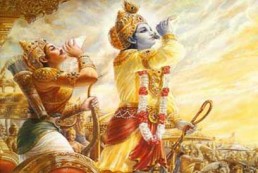Bhagavad Gita-Chapter 16 All Verses with Meaning and Audio
अभयं सत्त्वसंशुद्धिर्ज्ञानयोगव्यवस्थितिः ।
दानं दमश्च यज्ञश्च स्वाध्यायस्तप आर्जवम् ॥ १६-१॥
abhayaṃ sattvasaṃśuddhihi jñānayogavyavasthitiḥ
dānaṃ damaśca yajñaśca svādhyāyastapa ārjavam 16-1
दया भूतेष्वलोलुप्त्वं मार्दवं ह्रीरचापलम् ॥ १६-२॥
dayā bhūteṣvaloluptvaṃ mārdavaṃ hrīracāpalam 16-2
भवन्ति सम्पदं दैवीमभिजातस्य भारत ॥ १६-३॥
bhavanti sampadaṃ daivīmabhijātasya bhārata 16-3
अज्ञानं चाभिजातस्य पार्थ सम्पदमासुरीम् ॥ १६-४॥
ajñānaṃ cābhijātasya pārtha sampadamāsurīm 16-4
मा शुचः सम्पदं दैवीमभिजातोऽसि पाण्डव ॥ १६-५॥
mā śucaḥ sampadaṃ daivīmabhijāto’si pāṇḍava 16-5
दैवो विस्तरशः प्रोक्त आसुरं पार्थ मे शृणु ॥ १६-६॥
daivo vistaraśaḥ prokta āsuraṃ pārtha me śṛṇu 16-6
न शौचं नापि चाचारो न सत्यं तेषु विद्यते ॥ १६-७॥
na śaucaṃ nāpi cācāro na satyaṃ teṣu vidyate 16-7
अपरस्परसम्भूतं किमन्यत्कामहैतुकम् ॥ १६-८॥
aparasparasambhūtaṃ kimanyatkāmahaitukam 16-8
प्रभवन्त्युग्रकर्माणः क्षयाय जगतोऽहिताः ॥ १६-९॥
prabhavant yugrakarmāṇaḥ kṣayāya jagato’hitāḥ 16-9
मोहाद्गृहीत्वासद्ग्राहान्प्रवर्तन्तेऽशुचिव्रताः ॥ १६-१०॥
mohādgṛhītvāsadgrāhān pravartante’śucivratāḥ 16-10
कामोपभोगपरमा एतावदिति निश्चिताः ॥ १६-११॥
kāmopabhogaparamā etāvaditi niścitāḥ 16-11
ईहन्ते कामभोगार्थमन्यायेनार्थसञ्चयान् ॥ १६-१२॥
īhante kāmabhogārtham anyāyenārthasañcayān 16-12
इदमस्तीदमपि मे भविष्यति पुनर्धनम् ॥ १६-१३॥
idamastīdamapi me bhaviṣyati punardhanam 16-13
ईश्वरोऽहमहं भोगी सिद्धोऽहं बलवान्सुखी ॥ १६-१४॥
īśvaro’hamahaṃ bhogī siddho’haṃ balavānsukhī 16-14
यक्ष्ये दास्यामि मोदिष्य इत्यज्ञानविमोहिताः ॥ १६-१५॥
yakṣye dāsyāmi modiṣya ityajñānavimohitāḥ 16-15
प्रसक्ताः कामभोगेषु पतन्ति नरकेऽशुचौ ॥ १६-१६॥
prasaktāḥ kāmabhogeṣu patanti narake’śucau 16-16
यजन्ते नामयज्ञैस्ते दम्भेनाविधिपूर्वकम् ॥ १६-१७॥
yajante nāmayajñaiste dambhenāvidhipūrvakam 16-17
मामात्मपरदेहेषु प्रद्विषन्तोऽभ्यसूयकाः ॥ १६-१८॥
māmātmaparadeheṣu pradviṣanto’bhyasūyakāḥ 16-18
क्षिपाम्यजस्रमशुभानासुरीष्वेव योनिषु ॥ १६-१९॥
kṣipāmyajasramaśubhān āsurīṣveva yoniṣu 16-19
मामप्राप्यैव कौन्तेय ततो यान्त्यधमां गतिम् ॥ १६-२०॥
māmaprāpyaiva kaunteya tato yāntyadhamāṃ gatim 16-20
कामः क्रोधस्तथा लोभस्तस्मादेतत्त्रयं त्यजेत् ॥ १६-२१॥
kāmaḥ krodhastathā lobhastasmādetattrayaṃ tyajet 16-21
आचरत्यात्मनः श्रेयस्ततो याति परां गतिम् ॥ १६-२२॥
ācaratyātmanaḥ śreyastato yāti parāṃ gatim 16-22
न स सिद्धिमवाप्नोति न सुखं न परां गतिम् ॥ १६-२३॥
na sa siddhimavāpnoti na sukhaṃ na parāṃ gatim 16-23
ज्ञात्वा शास्त्रविधानोक्तं कर्म कर्तुमिहार्हसि ॥ १६-२४॥
ॐ तत्सदिति श्रीमद्भगवद्गीतासूपनिषत्सु
ब्रह्मविद्यायां योगशास्त्रे श्रीकृष्णार्जुनसंवादे
दैवासुरसम्पद्विभागयोगो नाम षोडशोऽध्यायः ॥ १६॥
jñātvā śāstravidhānoktaṃ karma kartumihārhasi 16-24
oṃ tatsaditi śrīmadbhagavadgītāsūpaniṣatsu
brahmavidyāyāṃ yogaśāstre śrīkṛṣṇārjunasaṃvāde
daivāsurasampadvibhāgayogo nāma ṣoḍaśo’dhyāyaḥ 24

Description
Bhagavad Gita Chapter 16 Summary
Daivāsura-Sampad-Vibhāga-Yoga – The Yoga of Differentiating Godly and Ungodly Assets
What are the qualities one must cultivate in order to advance spiritually towards liberation and on the other hand, what are the qualities that will drag us down? Explaining those qualities, this chapter classifies beings into the divinely good (“deva”) and diabolically fallen (“asura”) and describes the behavior of the latter at length. This is so that we may introspect and understand where we stand and correct the course as necessary. Below are the main themes of Chapter 16:
Verses 1 – 3
Daivī-sampat
Verses 4 – 21
Āsurī-sampat
Verses 22 – 24
Arjuna’s grief on seeing the enormity of the task he is about to undertake (śoka)
Gita Chapter 16 – Commentary by Swami Paramarthananda
Background
In the previous three chapters (XIII, XIV and XV) Bhagavān talked about Self-knowledge (jñānayoga) which is the direct means for liberation. In the following two chapters, Krishna discusses the values to be followed by a seeker. Though values themselves do not give liberation, they are necessary to gain knowledge. They alone prepare the mind and make it fit for receiving the knowledge. In fact, Vedānta is a pramāṇa (means of knowledge) only for a prepared mind.
In this chapter, Krishna divides all mental traits into two groups: daivī-sampat and āsurī-sampat. All sattvic traits come under the former, while rajasic and tamasic traits come under the latter. Daivī-sampat is conducive to Self-knowledge; āsurī-sampat is an obstacle to spiritual pursuit (5). [Without exception, every one in this universe falls under one of these two groups. From this it is evident that all seekers of knowledge must necessarily lead a spiritual (sattvic) life avoiding materialistic (rajasic and tamasic) tendencies.]
Krishna enumerates daivī-sampat (1 to 3) and āsurī-sampat (4 to 21) which is listed below:
Daivī-sampat
Fearlessness (1)
Purity (1, 3)
Scriptural Study (1)
Charity (1)
Sense-control (1)
Worship of God (1)
Austerity (1)
Straightforwardness (1)
Non-violence, kindness to all and absence of ill-will (2, 3)
Truthfulness (2)
Renunciation (2)
Calmness and patience (2, 3)
Absence of slander (2)
Absence of greed (2)
Gentleness (2)
Modesty (2, 3)
Steadfastness and absence of restlessness (2, 3)
Strength (3)
Āsurī-sampat
Vanity (4, 10, 14, 15, 17, 18)
Arrogance (4, 10, 14, 15, 17, 18)
Pretension (4, 10, 17)
Anger (4, 12, 18)
Cruelty (4, 9)
Ignorance (4, 15)
Impurity (7)
Absence of religious discipline
Absence of truthfulness (7)
Absence of faith in God (8, 18)
Endless desire for sense-pleasure (10, 11, 12, 16, 18)
Delusion (10, 15, 16)
False values (10, 16)
Worry (11)
Attachment (12)
Greed (12, 13, 14)
Egoism (18)
Slander (18)
Āsurī-sampat leads a person astray causing (spiritual) destruction ultimately (19, 20). Krishna sums up the entire āsurī-sampat as the three basic materialistic traits of desire, anger and greed. They are the three-fold gateway to hell (21). When one avoids these three traits and adopts the divine virtues, daivī-sampat, one becomes qualified for Self-knowledge and attains liberation soon (22).
The Lord concludes the chapter by pointing out that śāstra is the pramāṇa in determining what is right and wrong. One should know what the scriptures say and act accordingly (23, 24).
Gita 16th Chapter – Main Points
Daivī-sampat: 1 to 3
Āsurī-sampat: 4 to 21
Importance of śāstra and conclusion: 22 to 24
Since this chapter deals with daiva (spiritual) and āsura (materialistic) traits, it is called Daivāsura sampad vibhāga-yoga.
Other Bhagavad Gita Shlokams
Bhagavad Gita
The Bhagavad Gita, or the Song of the Lord, is a dialogue between Krishna, an incarnation of Vishnu, and his friend and disciple, Arjuna. Composed of 701 Shlokas arranged in 18 chapters, the Gita is one of the best-known philosophical texts of…
Bhagavad Gita-Chapter 01 All Verses with Meaning and Audio
Bhagavad Gita Chapter 1 All Verses for easy chanting along with Audio and Meaning. Lyrics In English, Sanskrit, Hindi, Telugu, Tamil, Gujarati, Bengali and many more languages.
Bhagavad Gita-Chapter 02 All Verses with Meaning and Audio
Bhagavad Gita Chapter 2 All Verses for easy chanting along with Audio and Meaning. Lyrics In English, Sanskrit, Hindi, Telugu, Tamil, Gujarati, Bengali and many more languages.
Bhagavad Gita-Chapter 03 All Verses with Meaning and Audio
Bhagavad Gita Chapter 3 All Verses for easy chanting along with Audio and Meaning. Lyrics In English, Sanskrit, Hindi, Telugu, Tamil, Gujarati, Bengali and many more languages.
Bhagavad Gita-Chapter 04 All Verses with Meaning and Audio
Bhagavad Gita Chapter 4 All Verses for easy chanting along with Audio and Meaning. Lyrics In English, Sanskrit, Hindi, Telugu, Tamil, Gujarati, Bengali and many more languages.
Bhagavad Gita-Chapter 05 All Verses with Meaning and Audio
Bhagavad Gita Chapter 5 All Verses for easy chanting along with Audio and Meaning. Lyrics In English, Sanskrit, Hindi, Telugu, Tamil, Gujarati, Bengali and many more languages.
Bhagavad Gita-Chapter 06 All Verses with Meaning and Audio
Bhagavad Gita Chapter 6 All Verses for easy chanting along with Audio and Meaning. Lyrics In English, Sanskrit, Hindi, Telugu, Tamil, Gujarati, Bengali and many more languages.
Bhagavad Gita-Chapter 07 All Verses with Meaning and Audio
Bhagavad Gita Chapter 7 All Verses for easy chanting along with Audio and Meaning. Lyrics In English, Sanskrit, Hindi, Telugu, Tamil, Gujarati, Bengali and many more languages.
Bhagavad Gita-Chapter 08 All Verses with Meaning and Audio
Bhagavad Gita Chapter 8 All Verses for easy chanting along with Audio and Meaning. Lyrics In English, Sanskrit, Hindi, Telugu, Tamil, Gujarati, Bengali and many more languages.
Bhagavad Gita-Chapter 09 All Verses with Meaning and Audio
Bhagavad Gita Chapter 9 All Verses for easy chanting along with Audio and Meaning. Lyrics In English, Sanskrit, Hindi, Telugu, Tamil, Gujarati, Bengali and many more languages.
Bhagavad Gita-Chapter 10 All Verses with Meaning and Audio
Bhagavad Gita Chapter 10 All Verses for easy chanting along with Audio and Meaning. Lyrics In English, Sanskrit, Hindi, Telugu, Tamil, Gujarati, Bengali and many more languages.
Bhagavad Gita-Chapter 11 All Verses with Meaning and Audio
Bhagavad Gita Chapter 11 All Verses for easy chanting along with Audio and Meaning. Lyrics In English, Sanskrit, Hindi, Telugu, Tamil, Gujarati, Bengali and many more languages.
Bhagavad Gita-Chapter 12 All Verses with Meaning and Audio
Bhagavad Gita Chapter 12 All Verses for easy chanting along with Audio and Meaning. Lyrics In English, Sanskrit, Hindi, Telugu, Tamil, Gujarati, Bengali and many more languages.
Bhagavad Gita-Chapter 13 All Verses with Meaning and Audio
Bhagavad Gita Chapter 13 All Verses for easy chanting along with Audio and Meaning. Lyrics In English, Sanskrit, Hindi, Telugu, Tamil, Gujarati, Bengali and many more languages.
Bhagavad Gita-Chapter 14 All Verses with Meaning and Audio
Bhagavad Gita Chapter 14 All Verses for easy chanting along with Audio and Meaning. Lyrics In English, Sanskrit, Hindi, Telugu, Tamil, Gujarati, Bengali and many more languages.
Bhagavad Gita-Chapter 15 All Verses with Meaning and Audio
Bhagavad Gita Chapter 15 All Verses for easy chanting along with Audio and Meaning. Lyrics In English, Sanskrit, Hindi, Telugu, Tamil, Gujarati, Bengali and many more languages.
Bhagavad Gita-Chapter 17 All Verses with Meaning and Audio
Bhagavad Gita Chapter 17 All Verses for easy chanting along with Audio and Meaning. Lyrics In English, Sanskrit, Hindi, Telugu, Tamil, Gujarati, Bengali and many more languages.
Bhagavad Gita-Chapter 18 All Verses with Meaning and Audio
Bhagavad Gita Chapter 18 All Verses for easy chanting along with Audio and Meaning. Lyrics In English, Sanskrit, Hindi, Telugu, Tamil, Gujarati, Bengali and many more languages.
Gita Dhyanam
The Gītā Dhyānam, also called the Gītā Dhyāna or the Dhyāna Ślokas associated with the Gītā, is a 9-verse Sanskrit poem that has often been attached to the Bhagavad Gita, one of the most important scr
Bhagavad Gita-Chapter 16 All Verses with Meaning and Audio – Bhagavad Gita – Bhagavad Gita Chapter 16 All Verses Easy Chanting with Audio and Meaning, Lyrics



